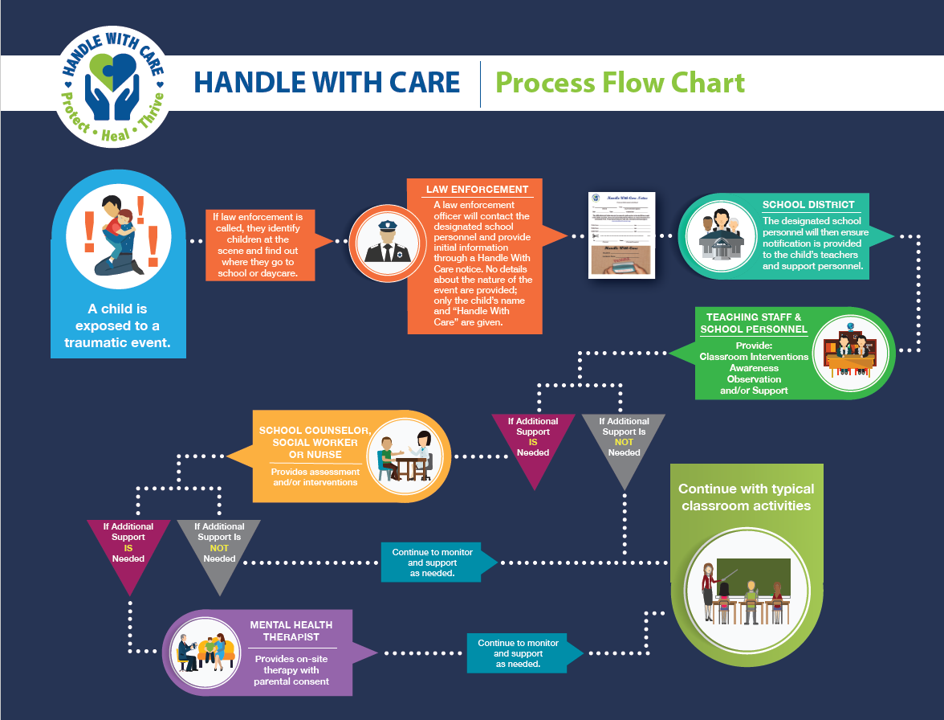Partners in Promoting School Safety
Working together as partners, Lawrence Public Schools and the City of Lawrence offer several successful programs to help provide a safe and secure learning environment for students in our community.
School Resource Officers: Providing A Safe Learning Environment
The Lawrence Police Department School Resource Officers (SRO) employ the National Association of School Resource Officers (NASRO) triad concept of school based policing. The triad concept divides the SRO’s responsibilities into three areas: Educator, Informal Counselor, and Law Enforcement Officer. By attending specialized training, SRO’s are able to educate, counsel, and protect our school communities. The men and women of the Lawrence Police Department SRO Unit continue to lead by example and promote a positive image of law enforcement to our community’s youth.
Using up to date techniques and equipment, SROs assist school staff in developing and practicing effective discipline policies, safety assessments and emergency preparedness plans. The City of Lawrence spends more than $600,000 annually to support six officers in our schools, one stationed at each of our middle schools and high school campuses.
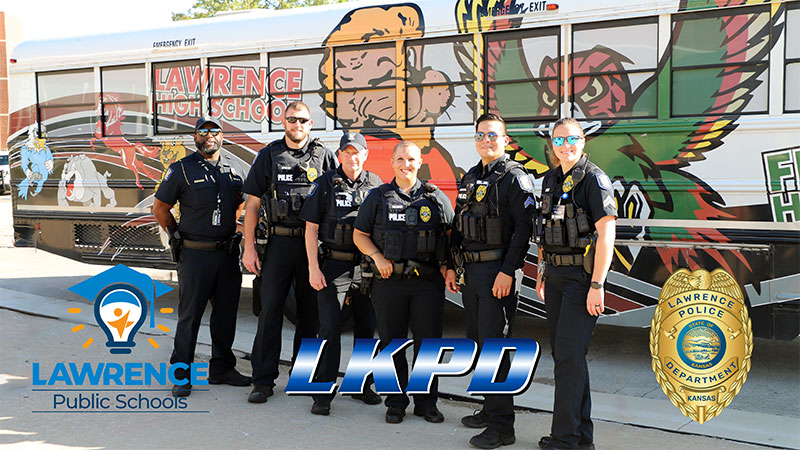
School Resource Officers: Lieutenant Myron Grady; Officer Danny Affalter at LMCMS; Officer Browning at BMMS; Officer Bailey Salsbury at SWMS; Corporal Dean Kemppainen at LHS; Corporal Kacey Wiltz at FSHS; Not Pictured: Officer Lindsay Bishop at WMS
Having a law enforcement officer on campus is an effective deterrent for common problems like theft, drug use and bullying. Having an SRO on campus can also dramatically improve response time in the event of an emergency. SROs serve as positive role models who help students develop early, positive relationships with law enforcement. A visible law enforcement presence discourages unwanted visitors at schools, and helps improve traffic and safety conditions near our schools.
SROs can often be found in classrooms, sharing information about substance abuse, drinking and driving, constitutional law, or even reading a book. Equipped with a unique range of tools to address school safety issues, they provide counseling, verbal caution, deterrence and intervention.
SRO’s can also help with mental health issues by recognizing signs and symptoms of mental health needs among students and staff, such as anxiety, depression, trauma, substance abuse, or suicidal ideation. They are also trained in de-escalating situations involving students who are experiencing mental health crises, such as emotional outbursts, self-harm, or aggression. By connecting students with appropriate resources such as school counselors, social workers, psychologists, or community-based mental health providers, SROs provide an alternative resource for those in need.
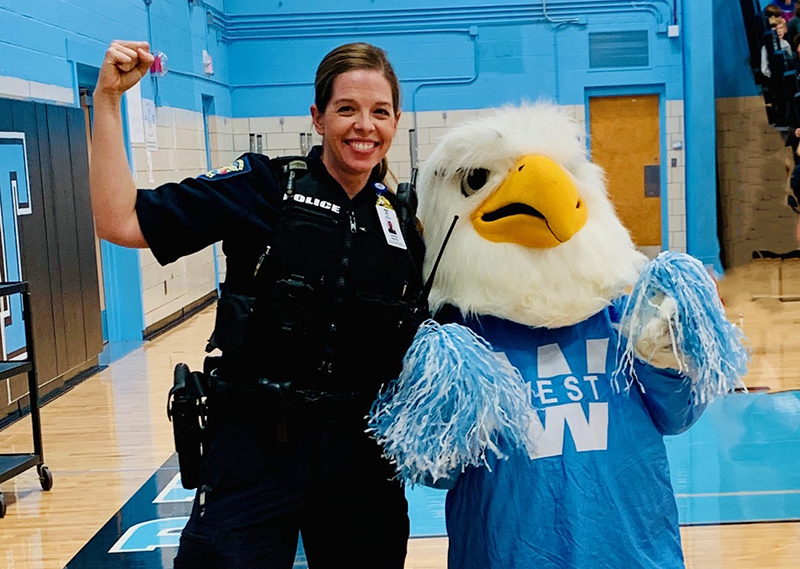
Officer Lindsay Bishop with WMS Mascot
First and foremost, the SRO program is about students. The primary goal is to preserve a safe environment conducive to student learning. Each SRO is an employee of the City of Lawrence, not Lawrence Public Schools. The SROs work closely, on a daily basis, with school staff to prevent and resolve issues by providing advice, mediation and, if necessary, intervention. The SRO program provides an important opportunity for officers
to share information with students in a classroom setting, and to interact with them in a non-adversarial way, building positive relationships and rapport.
SROs also offer a wide range of summer activities for the youth of Lawrence. Offering two summer Police Camps and a Teen Police Academy allows SROs to connect with students throughout the year and not just while they are in school, building relationships that will last a lifetime.
School Crossing Guards: Improving Safety Before and After School
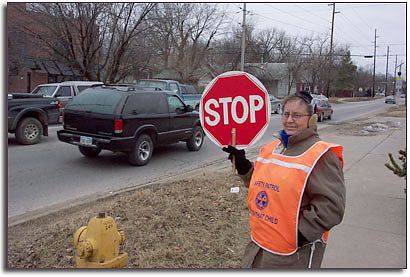
City of Lawrence Crossing Guard Marilyn Wiggins
Arrival and dismissal times at area schools are busy. School crossing guards improve safety conditions for young pedestrians by making sure they use marked crosswalks and do not cross streets against traffic lights. The City of Lawrence invests $93,500 annually to improve student safety by funding 14 crossing guards at local elementary schools.
WRAP: A Partnership Supporting Mental Health Needs in Schools
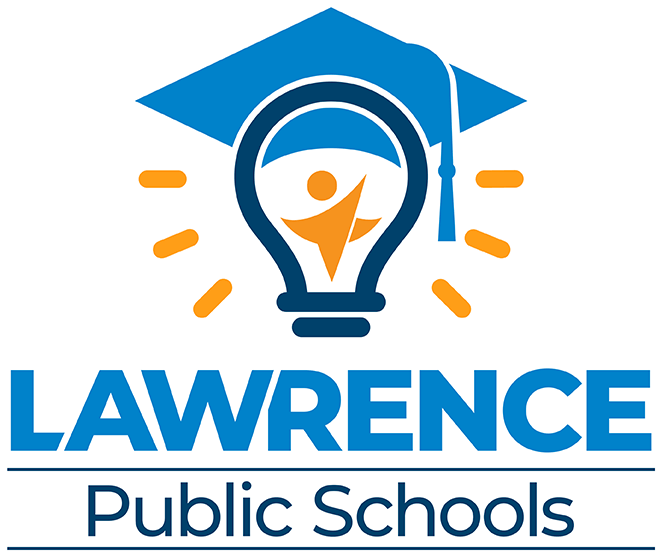
Lawrence Public Schools and the Bert Nash Community Mental Health Center partner to offer a prevention and early intervention program called WRAP or Working to Recognize Alternative Possibilities. WRAP places licensed, master’s-level mental health specialists in Lawrence schools. Douglas County and the City of Lawrence have supported the program with funding. Working closely with teachers, support staff, students, and families, WRAP clinicians help provide screening, assessment, early intervention, prevention, and referral services to students and their families in public school settings. WRAP specialists interact directly with students and families to help identify social and emotional issues early, before they may become serious challenges.
Handle with Care Program: A Coordinated Program Helping Students Who Experience Trauma
Too often, children in our community witness trauma. Lawrence Police officers see it on a regular basis but, for various reasons including privacy concerns, help is never offered. A commonsense solution is underway in Lawrence to change that.
“Handle with Care” is a cooperative program between DCCCA, Lawrence Public Schools, and the Lawrence Kansas Police Department to help ensure a child well-being is a top priority.
“Handle with Care” provides the school with notification when officers encounter a child at the scene of a traumatic event. The traumatic event could range from a motor vehicle accident to witnessing a violent crime. A confidential communication which simply says, “Handle with Care” along with the child’s name and grade is given to the appropriate school employee.
“No other information about the crime is given to school administrators or anyone outside the police department,” says SRO James Browning, “and frankly, the details of the incident are not what’s important. It’s simply important for the experts who see the child every day, to know their student may be a bit out of sorts so they can offer appropriate resources. Meanwhile, we’re still able to protect the child’s privacy and the privacy of the adults involved.”
Identifying these children allows teachers to decide if the child simply needs a little extra time to complete their work, a trusted adult to talk with, or possibly more structured expert care. The teacher may choose to implement trauma sensitive interventions and refer the student to the counselor.
Lawrence Public Schools Superintendent, Anthony Lewis, says, “This is an excellent program for us, for our scholars, and our families. When the notice is received at the school, it is on a need-to-know basis. It goes to the teachers working with that child, the counselors, and the school nurse. It does not stay in a child’s permanent record. We believe it helps mitigate the negative impact of trauma.”
Lydia Fuqua, DCCCA Lead Prevention Specialist says, “Handle with Care” helps children succeed in school through a simple system of awareness, giving us the opportunity to connect them with mental health services if they need it. It’s a great example of community resources coming together to serve our most vulnerable neighbors.” For more information, visit: Handle with Care — Engage Douglas County

